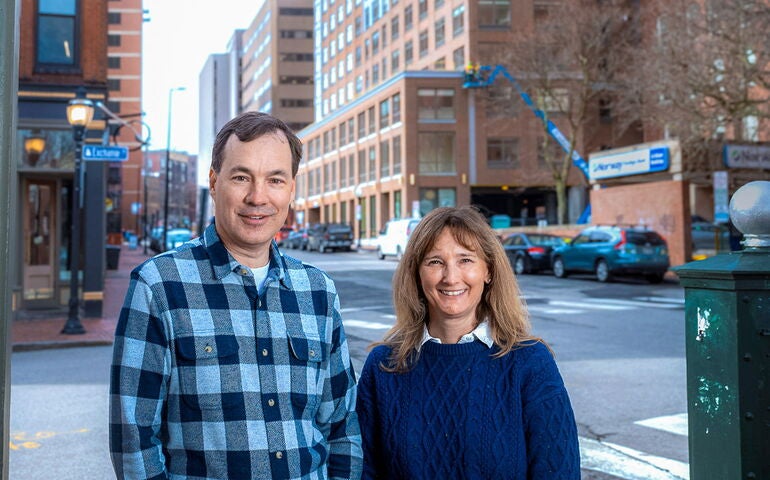Business Leaders: Jonathan and Catherine Culley haven’t shied from developing housing in Portland
 PHOTo / Tim Greenway
Jonathan and Catherine Culley lead Redfern Properties, which has developed Maine’s tallest building, in Portland. The 18-story tower is dubbed the Casco, and some of it can be seen here behind them.
PHOTo / Tim Greenway
Jonathan and Catherine Culley lead Redfern Properties, which has developed Maine’s tallest building, in Portland. The 18-story tower is dubbed the Casco, and some of it can be seen here behind them.
Jonathan and Catherine Culley, who lead Redfern Properties, have long flown under the radar as Portland developers.
But the development of the Casco, at 201 Federal St. in downtown Portland, is a major undertaking in many ways, not the least of which was getting approval for what would become Maine’s tallest building, at 18 stories. More significantly, the building will have 263 much-needed apartments.
Another project is the redevelopment of a former hospital site in Portland, with 165 units already in place. Along with a third project, Redfern has added about 500 apartments in the past six months alone. At a time when developers have gotten increasingly frustrated by Portland’s regulations, the Culleys have redoubled their commitment to developing housing in the city.
Mainebiz: How did the idea for Maine’s tallest building start to take shape?
Jonathan and Catherine Culley: Our longtime partner Drew Sigfridson [of the Boulos Co.] came to us with the idea. He and some partners had just closed on the purchase of the entire block bounded by Congress, Exchange, Federal and Temple. The Federal Street side of the property had a couple parking lots and an unsuccessful and deteriorating outdoor plaza.
Drew asked if we thought we could build some housing on that corner of the site — he was thinking four or five stories. We immediately saw this as an opportunity to do something big and bold. The location near the top of the Old Port is perfect both for housing and for a tall building. We quickly arrived at an 18-story building, which required only a subtle zone change.
MB: Was the city initially receptive to the idea?
J&CC: To the city’s credit, they were very receptive. The need for rental housing is well understood and city staff, the Planning Board and the City Council were united in support. Interestingly, of the roughly 10 major projects Redfern has done in Portland, this one received the least public resistance. There is almost always someone who shows up resisting the change that new buildings bring about. But this building being in a commercial district meant that there was no emotional response from nearby residents. Nobody showed up at any of the meetings to speak in opposition.
MB: It seems like the Casco would have been just as appealing (and possibly more profitable) as a condo tower or luxury apartments. Instead, you developed it with 263 apartments. Who did you see as the market for the apartments?
J&CC: For the past decade, Redfern’s focus has been high-quality apartments in Portland’s walkable neighborhoods. We never use the term luxury; that is a marketing term and doesn’t reflect our goals or values. We are trying to meet the need for rental housing for people who live and work in Portland. Many of our residents are moving to Portland from away seeking the same quality of life that we have come to enjoy.
It is critically important to create new housing for these people coming to Portland; without new housing to meet this new demand we will get gentrification of existing neighborhoods and displacement of longtime Portlanders, and that is an awful result. Our residents skew younger, most in their 20’s and 30’s, but we are seeing empty nesters and even elderly residents who seek the downtown car-free lifestyle.
MB: Elsewhere on the peninsula, you’re redeveloping the former Mercy Hospital site. Is the plan still to have as many as 500 housing units?
J&CC: With our partners NewHeight Group, we are just finishing the Nightingale which is 165 apartments, four commercial suites and a self-storage business in the old Mercy Hospital building. We are especially proud of the placemaking here.
In addition to the 165 apartments, we have several great food-related businesses around a landscaped plaza, and building amenities include a co-working suite, fitness room, library and billiards room, roof lounge and the best roof deck in Portland with amazing ocean views. As part of this project, we sold two properties to nonprofit Community Housing of Maine, which is building about 100 additional units of affordable housing and so we are proud of the social impact of this project.
Redfern also just completed Erlang, which is an adaptive reuse of the old telephone company building at 45 Forest Ave. into 81 apartments. In total, Redfern has completed over 500 new rental apartments in Portland in the last six months.
MB: In the broader picture, Maine needs at least 38,000 housing units (per MaineHousing estimates). Is there anything governments on the state or local level can do to streamline the process of proposing housing developments?
J&CC: The housing shortage is an acute crisis that, in addition to the obvious humanitarian issues, threatens the vitality of our region. Housing is now an issue impacting everyone. For example, restaurants in Portland are closing because they can’t find workers, because workers can’t find nearby housing.
This is a complex problem with no single solution. Local, state and most importantly, the federal government need to subsidize affordable housing in a big way. And the private sector has a huge role to play. For good or for bad, our society relies on private developers to create the vast majority of new housing.
Redfern is trying to do our part. We are in the early planning stages of more than 1,000 new apartment units on the Portland peninsula. Though we hope to get these projects done in the coming years, there are three major impediments. Construction costs remain very high from recent inflation.
Similarly, interest rates need to come down to enable new speculative development. And finally, it is well known that Portland has a very challenging regulatory burden for apartment developers. But even given these challenges, Redfern remains focused on creative solutions. We are very bullish on Portland’s future and the housing problem is not going away, so we will keep at it!













0 Comments